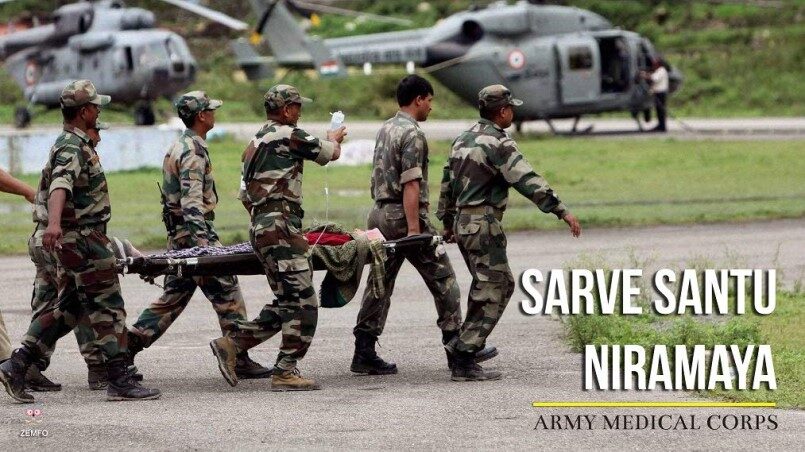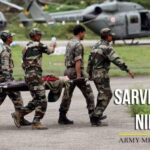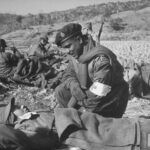Army Medical corps has the distinction of serving the Triservice, Army, Air force and Navy; secondly, highly qualified personnels, therefore, these two qualities makes it a unique distinct Service provider to the Armed forces India neither equitable nor Comparable to other arms and services. The younger group, the medical officers are posted to the fighter battalions of the Armed forces, called as the Regimental medical officers in army or squadron medical officers in Air force and the ship medical officers in Navy. These medical officers have similar charter of duties except involved specific to the needs of the service and its environment. It is interesting to mention that our watts up group AMC officers at Gurugram, many of them retired as Generals and Brigadiers had the privilege to serve the Armed Forces India as Regimental Medical Officers. This designation of Medical Officers started during the 2nd World War to Indian Doctors to exclusive Medical Care of the Defence Personnels and continued till to date.
6th – 7th December 1971, General Sagat GOC 4 corps briefed GOC 8 mountain division General Krishna Rao his plan capture Sylhet and directed Brigade Commander Bunty Quinn and Commanding Officer 4th Battalion 5thGorkha Rifles (FF) to act immediately.
Colonel Harolikar was the Commanding Officer – How the casualties be evacuated was the mind complexity of this Officer explains the role of the regimental Medical Officers and Medical Planning in the combat operations. This was probably the first and quickest heliborne operation in the military history. This was the battle between 258 Gorkha Indian Soldiers Vs 8000 Pakistanis. Medical Officers evacuated the casualties mid night dmilit helipad situation. The Commanding Officer Lieutenant Colonel Harolikar was awarded Mahavirchakra and the Regimental Medical Officer Captain Sengupta received Sena Medal.
Medical casualties is the key concern of the strategy of Combat offensive operations. 1st Battalion 5th Gorkhas were given the responsibility of straightening of Sejhra Bulge in Khemkaran sector of Punjab during 1971 war. This bulge was like a fist that extended into the Indian territory as a result of Radcliffe line drawn in 1946. This bulge was like a fist that extended into the Indian territory as a result of Radcliffe Line drawn in 1946 and facilitated Pakistan Army ingress into the Indian territory. It had the Gurudwara in the Rattoke Village which Pakistan had occupied during 1965, a contentious concern of the Indian Civilian, to bring back the Gurudwara. We quote Lieutenant Colonel Suresh Gupta, Commanding Officer of the Gorkha Battalion sand model discussion prior to the Combat Operations as far as the casualties are concerned, my regimental medical officer has made adequate arrangements for their evacuation. I have spoken to my officers, JCO’s and we are prepared to accept delay in the evacuation of casualties. This is based on our firm conviction that if we attack the way we want, there will be no delay as far as the task given to my battalion is concerned and the casualties would be minimal because of surprise factor . (1971 war stories of the Grit and Glory from the Indo-Pak war by Ian Cardozo P53). This was the changed strategy of the Commanding Officer contrary to the higher –echelon. Sejhra was captured on 6th December at 6:00 am.
Alternative plan, despite the overwhelming opposition of the commanding officer proved successful with minimal casualties – one JCO and 8 other ranks were lost and 23 other ranks wounded. This was the strategy of combat operation Winability with minimal casualties which will be taught as the principle of war operations in the training centres of Army.
1st – 3rd December 1971, Commander Zafar Khan was the Captain of the Ghazi Submarine of Pakistan. It had moved to the Indian Sea to destroy the Vikrant of the Indian Naval Sub-marine. Just prior to the orders to fire, the medical officer declared that the obnoxious fumes had polluted the air in the Submarine to dangerous levels posing a threat not only to the health of the crew but also to the submarine Ghazi. The hydrogen level were far above than the accepted level due to the batteries being old and decrepit, He recommended Ghazi to be brought to the surface level to take in the fresh air as lifesaving. It was the self-destruction of Ghazi Submarine if not brought to the surface level. This happened two or three times to bring the Ghazi to the surface on the advice of the medical officer. Here it is reported that the medical officer- regimental medical officer, has the responsibility to monitor the water and air environment for the health of the personnel under their care. However, Ghazi Submarine had self-destruction due to an internal explosion probably due to the detention of the combustible gas as reported by the medical officer to the Captain of the Ship – The Ghazi. It happened on 3rd December 1971 midnight at Vishakhapatnam harbor.
Army medical corps, officers and men, have earned the nation’s bravery awards such as Mahavir chakras, Vir chakras, Ashok chakra, Surya chakra, Sena medals, army commander’s commendations, mention and dispatches and peace time distinguished medals during combat operations and militancy war. Regimental medical officers are the Daredevil to operate under the fire of ballistics dedicated to the care of sick and wounded. I take pride to mention that some of them have sacrificed their own life to protect the life of others and damage to the equipment and property. Further these RMO’s did not desert the patients even when their battalion retreated and deserted their forward positions, dedicated medical care to the sick and wounded.
It speaks laurels of selfless exemplary courage, grit and valour during the combat operations, rightly so, awarded Vir chakras after release as prisoners of war. Some of the other rank medical men accepted their death while caring and saving the lives of their battalion soldiers. Under conditions of bombardment, air striking and air raids at the forward post during active operations – contact with the enemy. They have also been awarded Vir chakra. They are the war medical heroes, left their name to be remembered for future generations. They have been the real heroes of the nation and nation is grateful to their sacrifice. It is too small to suggest in memory of their sacrifices that we inspire and motivate our officers and men during AMC day celebrations, colonel commandant’s Darbar, AMC commandant’s address to the new generation, officers and men.
Captain Suresh Murty (later Brigadier) was regimental medical Officer, 22 Maratha Light Infantry (Hydrabadi) and participated throughout 3rd December to 16th December 1971 particularly the combat operations Durra, Barachangram and Hilli, has written the medical care – evacuation of casualities as the medical war diary. Probably this is the first time that the Regimental medical officer who participated in the war has written an exhaustive admirable account of personal experiences as the War Hero medical officer. All my batchmates BMOC-8 (photo enclosed) have participated during the 1971 operations, exchanged their experiences from time to time in our whatsaap group, has been a stimulus to write war medical heroes – the regimental medical officers.
Lieutenant Colonel Ahobala Krishnamoorthy Commanding Officer – 6 Garhwal who led the Chicken’s Neck Combat Operations of 26 infantry division on the north India borders commented “It is better to deserve awards and not get them, rather than have awards you do not deserve”. 6 Garhwal fought well yet it appeared that the higher command did not recognize their acts of courage. Army Medical Corps particularly Regimental Medical Officer have been awarded bravery courage grit and glory awards during combat operations since 1947 to 1971 definitely deserved more and recognization of their services probably remained under the dust of the battlefield. Dust is as sacred as the national award, rare occasion of the mankind to participate in Nations Service and apply their dust on the forehead as the patriot.



